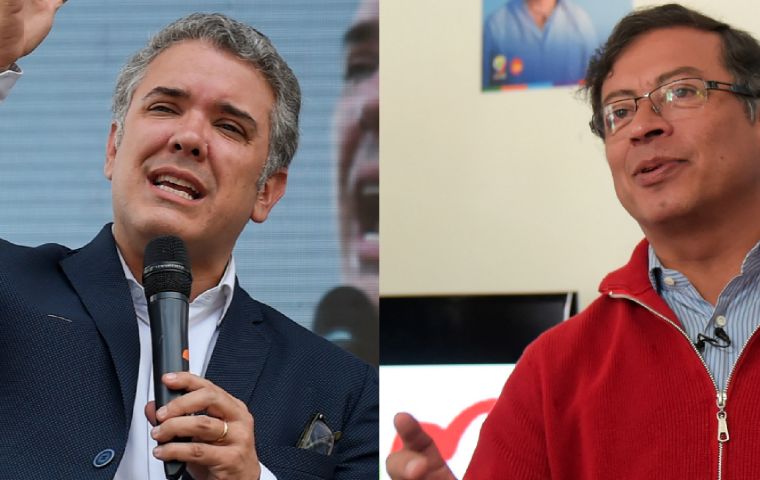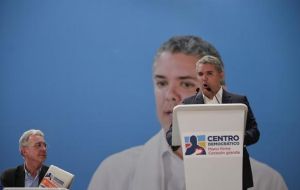MercoPress. South Atlantic News Agency
Colombia's presidential election: another referendum on the peace deal?
 The latest opinion polls released had Duque with an eleven percentage points lead. If no candidate gets a majority on May 27, a runoff vote will be held on June 17.
The latest opinion polls released had Duque with an eleven percentage points lead. If no candidate gets a majority on May 27, a runoff vote will be held on June 17.  Gustavo Petro, a former M-19 guerrilla and mayor of Bogotá, has voiced a desire to push the accord forward, but may lack the political support to do so if elected.
Gustavo Petro, a former M-19 guerrilla and mayor of Bogotá, has voiced a desire to push the accord forward, but may lack the political support to do so if elected.  Ivan Duque, a right-wing politician favored by former president Alvaro Uribe, who has vowed to make structural modifications to the accord.
Ivan Duque, a right-wing politician favored by former president Alvaro Uribe, who has vowed to make structural modifications to the accord. On Sunday, Colombians will head to the polls to elect a new president. At play in this year’s election are a range of issues: Venezuelan migration, economic situation, rampant corruption, high levels of inequality, but above all is the country's historic peace accord that ended over half a century of armed conflict.
The election is Colombia’s first since the government and the Revolutionary Armed Forces of Colombia (known as the FARC) agreed to the peace deal. Voters won’t only be casting their ballot for a new political leader, but also for a potential new path forward for Colombia and its fledgling peace process.
The two leading candidates have very different views of the deal’s future. On one extreme is Ivan Duque, a right-wing politician favored by former president Alvaro Uribe, who has vowed to make structural modifications to the accord. On the other, leftist candidate Gustavo Petro, a former M-19 guerrilla and mayor of Bogotá, has voiced a desire to push the accord forward, but may lack the political support to do so if elected.
The other presidential hopefuls, Germán Vargas Lleras, Sergio Fajardo and Humberto de la Calle, fall between the two leading candidates.
The latest opinion polls released had Duque with an eleven percentage points ahead of Petro. If no candidate gets a majority of the votes on May 27, a runoff vote will be held between the top two candidates on June 17.
The presidential election, however, is just the first step toward ensuring the peace deal’s success and survival.
“On signing this agreement, as president of all Colombians, I want to invite all, with an open mind and open heart, to give peace a chance,” Santos said at a ceremony in Bogotá on 14 November 2016. A month before, 50.2% of Colombians voted to reject the accord in a referendum.
The accord was slightly amended and it later passed in congress by a vote of 130-0 in the Lower House and 75-0 in the Senate (members of Uribe’s party abstained from the vote.)
In October 2017, the accord gained legal protection under the law after Colombia’s Constitutional Court ruled that congressional approved legislation related to the peace deal cannot be annulled for twelve years. While this ensures that the accord will exist in some form not just beyond the next three presidents, it does not protect parts of the deal not yet approved by Congress.




Top Comments
Disclaimer & comment rulesCommenting for this story is now closed.
If you have a Facebook account, become a fan and comment on our Facebook Page!